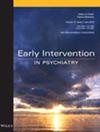Individuals with genetic high-risk for psychosis experience impaired coping styles compared with healthy controls
Abstract
Background
Individuals with schizophrenia tend to have negative coping styles and low levels of self-esteem, but it is unclear whether coping styles and self-esteem levels are altered in people in the prodromal phase of psychosis.
Aims
The study was designed to assess the role of coping style and self-esteem in the context of different phases of schizophrenia.
Methods
Recurrent Schizophrenia (ReSch), first-episode schizophrenia patients (FEP), genetic-high risk for psychosis (GHR) patients, and healthy controls (HC) (40 per group) were subjected to in-person clinical interviews. The results of these interviews were then used to gauge coping style and self-esteem using the Coping Styles Questionnaire (CSQ) and the Rosenberg's Self-Esteem Scale (RSES). Data were analyzed through ANCOVAs and logistic regression analyses.
Results
The results found that positive coping style (CSQ problem-solving and CSQ seeking for help) generally decline with progression through the HC, GHR, and FEP groups, while negative coping style (CSQ fantasy, CSQ repression and CSQ self-blame) generally increase with progression through the HC, GHR, and FEP groups (except that GHR group was slightly lower than HC group in CSQ self-blame). Results for members of ReSch group were in line with those of members of the FEP group in coping style. At the level of self-esteem, the GHR group was similar to the HC group and significantly higher than the FEP group and the ReSch group. Logistic regression analyses indicated that GHR group patients exhibited increased negative coping styles (CSQ fantasy) relative to members of the HC group, but had greater Positive coping style (CSQ problem-solving) than did members of the FEP group.
Discussion
These findings suggest that both GHR individuals experience impaired negative coping styles which expands the understanding of the psychological characteristics of the prodromal group. Further explorations are warranted to develop optimal psychosocial interventions.

 求助内容:
求助内容: 应助结果提醒方式:
应助结果提醒方式:


